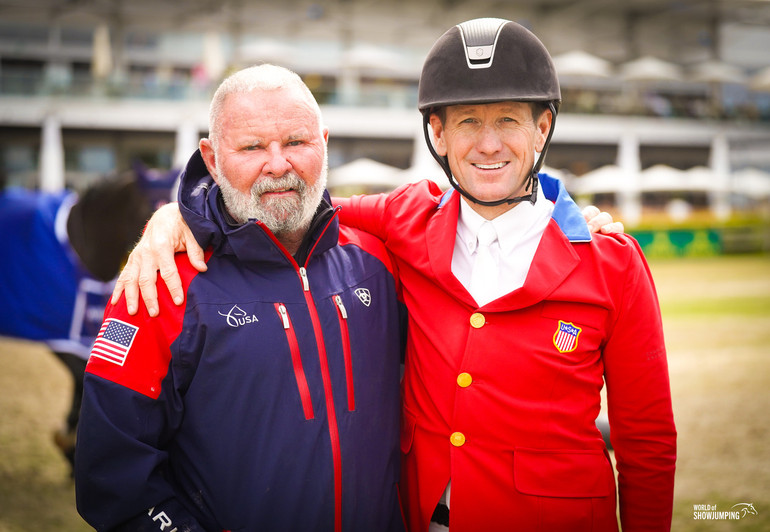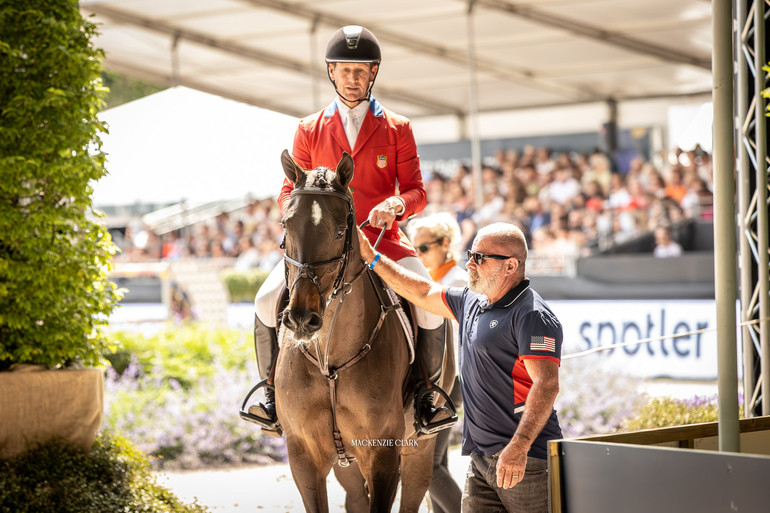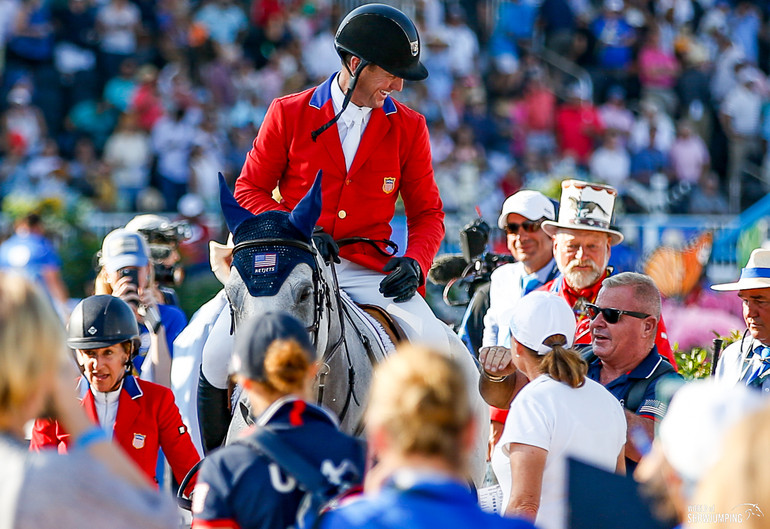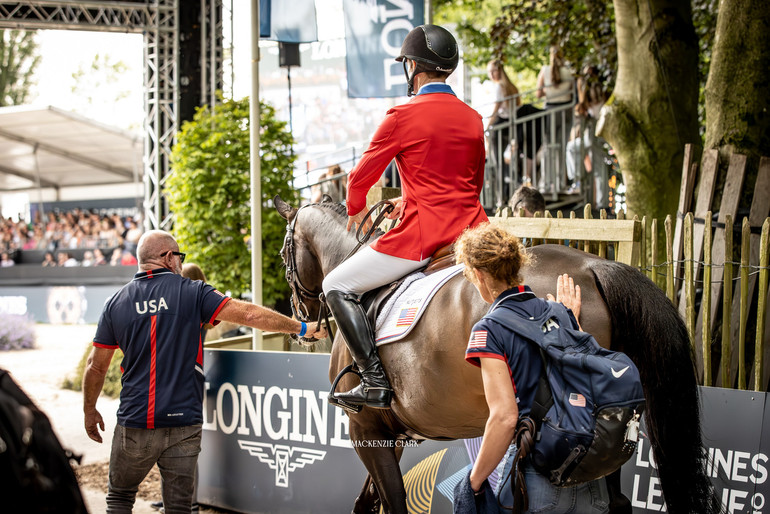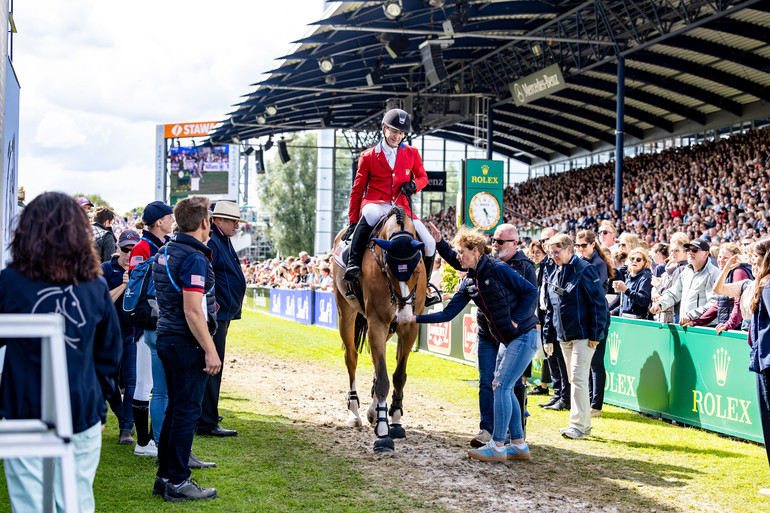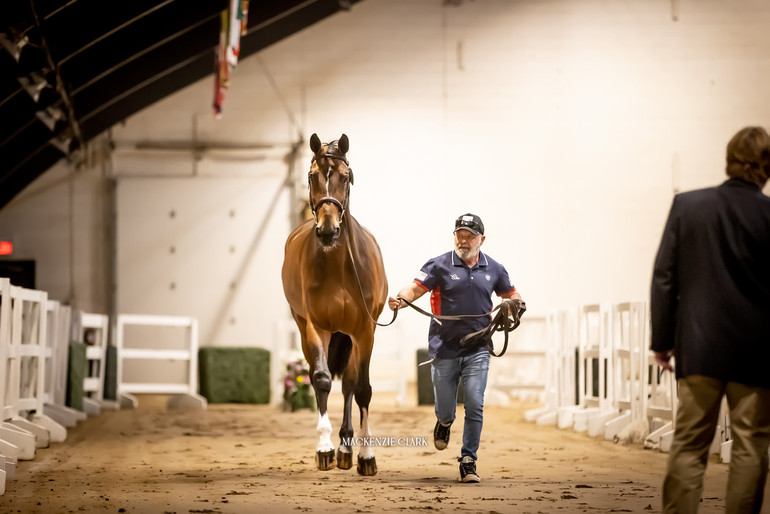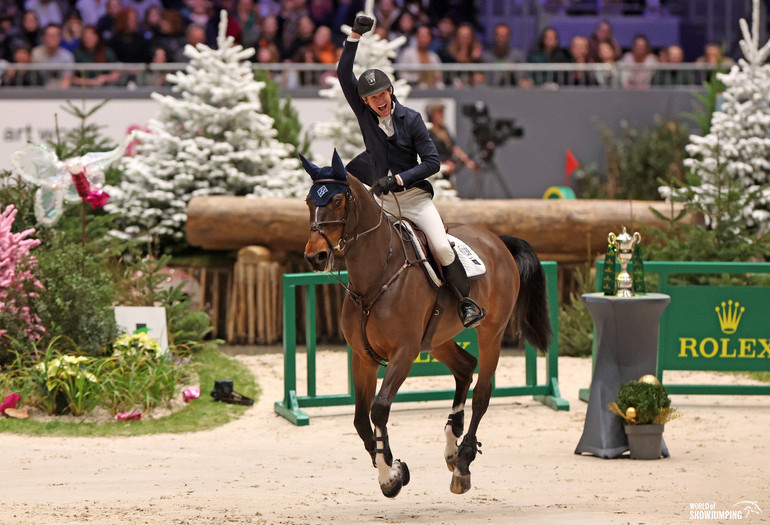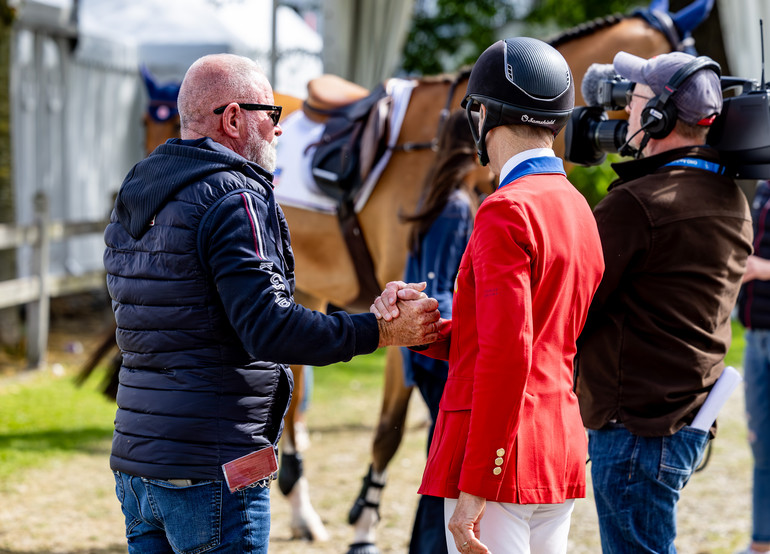Text © World of Showjumping
“I owe Lee an incredible debt of gratitude for the career we've had,” McLain Ward tells World of Showjumping about his groom of 35 years – Lee McKeever. “I don't say I've had; we've had, we've done the body of work. That is something that we are seeing more and more credit given in the sport nowadays. More ignorant riders don't realize what it takes behind them. I think I have a good vision of where we want to go and a belief in the goals; I'm very determined and I think I ride well most of the time. However, Lee is the better horseman in our team. Lee is a horseman through to his core and he shares his knowledge without any resentment, in a positive way.”
Like having an older brother
The story behind one of the most longstanding and iconic partnerships in the sport started in 1988 when Lee first came to the United States. Lee – who had fallen in love with horses in his native Ireland – was planning to move to Switzerland to work as a groom, when a suggestion from a friend made him change course. “Back then, for many European grooms, Switzerland was the place to go,” he explains. “However, a friend of mine said I should go to America instead. At the time, I said I was coming to America for a year. That was in 1988, I was 18 – and here we are, 36 years later.”
We started going on the road together when I was 14 and we're still at it – through a lot of ups and downs, but the story keeps going
- McLain Ward -
“Lee was supposed to work for somebody else for one year, but that job wasn't available when he arrived in New York,” McLain fills in. “My father knew Jimmy Doyle who had arranged for Lee to come to America, and Jimmy asked my dad to take this boy to his place. Lee is seven years older than me, and when I started to ride at my father's place and go there on the weekends, having Lee there was like a having an older brother. I came from a bit of a dysfunctional family; my parents were divorced. Lee and I bonded and had a great friendship. We started going on the road together when I was 14 and we're still at it – through a lot of ups and downs, but the story keeps going.”
Growing pains
A month after Lee started to work for McLain’s father, Lee’s wife-to-be Erica joined the team, the two married in 2002 and today, they run the operation at Castle Hill Farm. Over the years, as McLain’s operation has grown, Lee’s role has evolved and while the changes in Lee’s role have enabled him to keep going, it has been a challenge to delegate and learn to trust that the job he so dearly loves will get done even if he does not do it personally.
We've all had to grow in different directions and there's been growing pains, difficult moments and challenges in our careers, but we've tried to support each other
- McLain Ward -
“It has become what one would call a family business or a family operation,” McLain explains. “We all have our roles, which are equally important and equally part of the success. Lee started as a groom for me and we had a very tight personal relation, which can make things wonderful but can also complicate the mixture. Over time, as we've both gotten older, his role had to grow more to being a manager and overseeing multiple horses, multiple people. I think that was challenging for him because he was so hands on and the care for the horses was so vitally important to him. I think there was a period of letting go of that control that was a struggle, because nobody was going to do the job as well as he did. However, he had to grow as our operation changed and we grew as individuals. Now he's married and has built a family and I have a young family and we all live somewhat together on a farm. We've all had to grow in different directions and there's been growing pains, difficult moments and challenges in our careers, but we've tried to support each other.”
“As a groom, it's hard to hand the job over to somebody else and feel that at the end of the day the job is going to get done,” Lee shares his view. “It might not get done as well as you wanted or the way you would do it, but it's always going to get done. However, it is a hard thing to give up because you always feel that you want to do your best, so you try to do everything, but you can't – and if you try to do it all alone, you end up getting burned out. Letting go was very hard for me. You've got to trust the people that work for you and have good people. It is a bit of a control issue at the start and I think you've got to allow the change to happen. In the end, I think everybody does a better job once the roles are clear, because then everybody is more relaxed and enthusiastic. We have both grown and I feel it's a very good partnership. I still travel everywhere; I kind of run the show part of it, and my wife Erica runs the home operation.”
I think everybody does a better job once the roles are clear, because then everybody is more relaxed and enthusiastic
- Lee McKeever -
“I think one of the things in our relationship that has been key to the longevity is that no matter what the problem is, no matter what the challenge, the dispute or fight is, when we go out of the door, we are together,” McLain points out. “Everybody knows that – and I think that has stood the test of time.”
More of a business than a sport
While Lee’s role has evolved, so has the sport – but not necessarily for the better. “The devotion to the horses has changed,” Lee says when asked about the changes he has witness in the sport and within the community of grooms. “People stay shorter in the business and there are more freelance grooms nowadays. I feel like the younger generation doesn’t do the job for the horses as much as the older generation did. I have done it all for the love of the horses and the competition, but I think society has changed and the sport has developed. There's a lot more shows, it's so much busier… I don't know necessarily if it has changed for the better or for the worse, but it's gotten bigger; it's more of a business now than a sport I find.”
I don't know necessarily if it has changed for the better or for the worse, but it's gotten bigger; it's more of a business now than a sport I find
- Lee McKeever -
“The growing acknowledgement to grooms is great, but I find that the things that have been worked on are not the real issues that need attention,” Lee continues. “There are underlying issues, like safer stables, wider aisles, closer water tabs, closer toilets, better food; those are things we need to work on, not just awards.”
I find that the things that have been worked on are not the real issues that need attention
- Lee McKeever -
“The first good thing is the fact that there is a conversation about it,” McLain weighs in on the importance of acknowledging grooms and the essential role they play. “However, it is one thing for people to talk about it, but living as they preach is something else. How do people actually run their organization, how do they work with their staff and how do they treat others? In the conversations I have with colleagues and those involved in the sport, when one can say that they've had their owners a long time or they've had the same team around them for a long time, that is always a compliment. It's a sign of how you interact in your relationships.”
“I don't think it's necessarily down to the events to create the right working environment, though,” McLain points out. “Any show facility should be first and foremost horse friendly and horse safe – and that will typically make the grooms happy. Obviously, one real problem I think we have is that organizers, the sport – and the world in general – think people can just go 24/7, 365 days a year."
One real problem I think we have is that organizers, the sport – and the world in general – think people can just go 24/7, 365 days a year
- McLain Ward -
"We have a sport where you can go to a show every single day of the year if you want to, and shows don't mind running all day and all night. The plus sign of that is that we have a healthy industry, with people wanting to do our sport, wanting to participate on all levels. We have an industry that's not struggling in participation, but it has to be managed and we have to realize that the horses can't go every week, every day, all day long. And the riders can't do it, the grooms, all of the support staff, all of the professionals around us cannot do it either. We also can't ask the people who support us to keep pouring out money. At some point, there has to be a balance; balance in the schedules, a balance in all of these different aspects. We should not get distanced from why we do the sport and why we work with horses and just go for more and more and more. However, a right balance is very difficult to achieve in anything in life, not just in our sport.”
We should not get distanced from why we do the sport and why we work with horses and just go for more and more and more
- McLain Ward -
“I'd like the sport to develop, but not be so extremely busy,” Lee agrees. “I find the schedule very hard nowadays, especially for the horses. I think that's why you see that the horses’ careers are not lasting as long as they used to. We have to look at the bigger picture and really consider what is going on. As a community, I think we need to speak to each other a little bit more honestly and openly. It goes with the competitiveness of the sport that in this business, you've got a lot of acquaintances, but very few friends. Everything seems great on the surface, but when you get deeper, there are not that many people there for you.”
Luck plays a big role
With horses such as HH Azur, Contagious, Sapphire, Rothchild, Antares F, HH Carlos Z and Clinta, McLain and Lee have enjoyed huge success during their career. However, there have also been darker moments. “There are a lot of highs in this sport, but unfortunately also many lows,” Lee says about the nature of equestrian sport where the tables can turn rapidly. “I think you got to have lows to appreciate the highs. When you are going through a low, you got to believe in what you do and not start changing everything. When you're good at what you do, you better ride it through. Honestly, there's a lot of luck in this sport, too. In some of the big classes we've won, we've had a lucky rub and it stayed up and then other times, you have the lightest rub and the fence falls down. Nothing can really change that; I think luck plays a huge role in this sport.”
When you're good at what you do, you better ride it through
- Lee McKeever -
One of the most memorable moments for Lee came in 2017 when HH Azur won the World Cup Final on home soil in Omaha, USA. “That was huge,” he says. “There have been many great moments. For me, Rothschild being fifth individually and claiming team bronze at the World Equestrian Games in Caen in 2014 was huge, because nobody really believed in that horse and he went there and gave it his all. There have been so many horses that have done so much for us, it's hard to pick only a few moments – there have been so many special occasions.”
And with all they have achieved together, there is still plenty of room for dreaming. “I'd love to win Aachen,” Lee says. “We never won it; we were second four times. And an individual Olympic medal – those are the two we are missing.”
The most successful structure
The idea of a rider building a team of different people with varied skill sets to help them be as successful as possible and give them as a rider the biggest margin of error, is today widely accepted as the most successful set-up in the sport. “I'm very proud to say that in terms of this structure, we were a little bit ahead of our time,” McLain says. “I remember 30 years ago when we started out, there was no talk of team; this was an individual sport. Now, everybody talks about the team of people behind them and all of the different pieces that it takes to be successful at the highest level of the sport; whether it be stable managers, grooms, blacksmiths, veterinarians – who are the most obvious – but then there are other people as well, administrators, different people in your circle, family. The best in the world have long standing teams and every person on those teams is vital to the success.”
I remember 30 years ago when we started out, there was no talk of team
- McLain Ward -
“It happened naturally and by chance; I can't say that we had some genius idea that we were going to build that,” McLain continues to explain about the system he and Lee have created. “We were two people that came together in the right moment in our lives. I had this vision to do the sport in a certain way and to accomplish certain things and Lee saw that journey forward. Lee brings to the table his skills of obviously caring for the horses, his knowledge of the health of the horse, what keeps these horses sound, healthy and happy, but also, what keeps the people that are working with us sound, healthy and happy. I always say that all of this structure, all of this organization, all of these very skilled people give me a bigger margin of error when I go in the ring – as does a great horse.”
All of these very skilled people give me a bigger margin of error when I go in the ring – as does a great horse
- McLain Ward -
“Appreciating each other and realizing that an individual rider is not the key to success – and certainly not to any sustained success – is essential,” Mclain concludes. “You need a correct structure, but most importantly, you have to live as you believe, live what you preach. The one that claims to be a horseman because they give their horse a carrot when it's convenient for them is not a horseman. A horseman is someone who always makes sure that the horses are cared for and creates a correct life for the horses and the people around them.”
16.7.2024 No reproduction of any of the content in this article will be accepted without a written permission, all rights reserved © World of Showjumping.com. If copyright violations occur, a penalty fee will apply.



